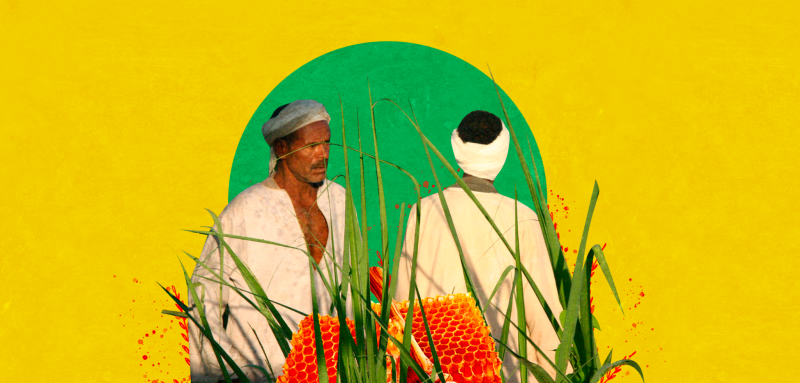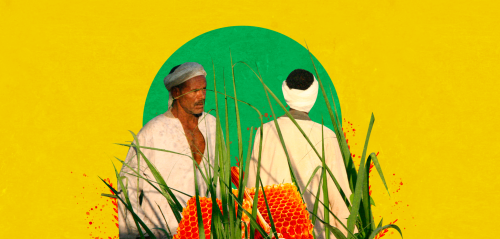Since last November, Egypt has experienced a crisis in the availability and cost of packaged sugar for household and industrial use, due to a lack of supply. The crisis has resulted in an additional increase to the price of baked goods and more.
The Egyptian government, as is custom, has blamed the current situation on merchants and their greed, while completely ignoring the regulatory and environmental issues related to the crops used in sugar production, as highlighted by Raseef22 in a previous report on the sugar beet crop.
Although Egypt has historically relied on sugarcane, it has gradually reduced its dependence on it in recent years as it is a high consumption crop. The government quickly used this to justify its decision to shut down the Abu Qurqas Sugar Factory after 155 years of continuous operation.
Since last November, Egypt has experienced a crisis in the availability and cost of packaged sugar for household and industrial use, due to a lack of supply. The crisis has resulted in an additional increase to the price of baked goods and more.
The government justified the factory's shutdown by citing a decline in sugarcane farmers, well-known in Upper Egypt, and their decision to no longer supply their produce to the factory. Instead, these farmers have preferred to supply their crops to blackstrap molasses mills, due to the higher price they offer. The government did not announce any intention or steps to review supply prices to encourage farmers to deliver sugarcane to sugar manufacturers, which the government considers a strategic commodity. Is this one in a series of hasty and unconsidered decisions taken by the Egyptian government?
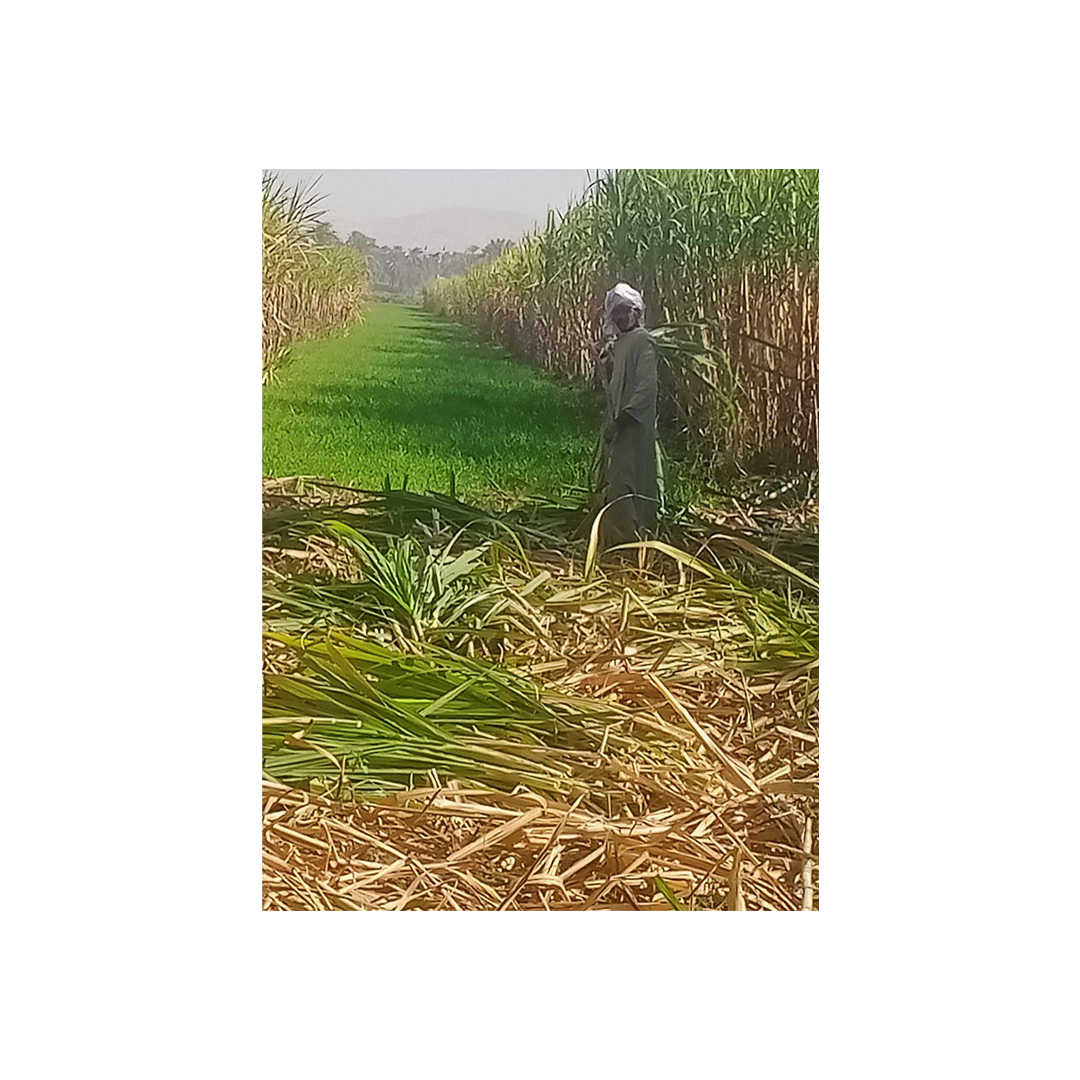 Sugarcane crop produce in Aswan
Sugarcane crop produce in Aswan
Unreasonable supply prices
In an official statement regarding the closing of the government-owned Abu Qurqas Sugar Factory, the Ministry of Supply pinned the decline in supply of sugarcane in 2023 to the “lack of alignment with the supply price” set by the ministry. Farmers considered the amount of 1,500 Egyptian pounds per ton inadequate (approximately $48, according to the official dollar exchange rate, and $26 according to the parallel market rate). This led them to supply their production to black honey mills and private factories, where the price exceeded 2,000 Egyptian pounds per ton. In other parts of the world, the global price per ton of sugarcane reached $663.
Farmers across various provinces have adopted the practice of supplying sugar to private factories instead of those affiliated with the Ministry of Supply, while some have shifted from sugarcane cultivation to growing wheat and beets.
Farmers across various provinces have adopted the practice of supplying sugar to private factories instead of those affiliated with the Ministry of Supply, while some have shifted from sugarcane cultivation to growing wheat and beets.
The supply price is not the only reason for the decline in sugarcane cultivation in Egypt. Various climatic and regulatory factors have led to the current dilemma, which is associated with various important industries beyond sugar, such as the manufacture and production of medical alcohol, paper, fertilizers,, and other industries in which Egypt achieved a considerable degree of self-sufficiency in previous times.
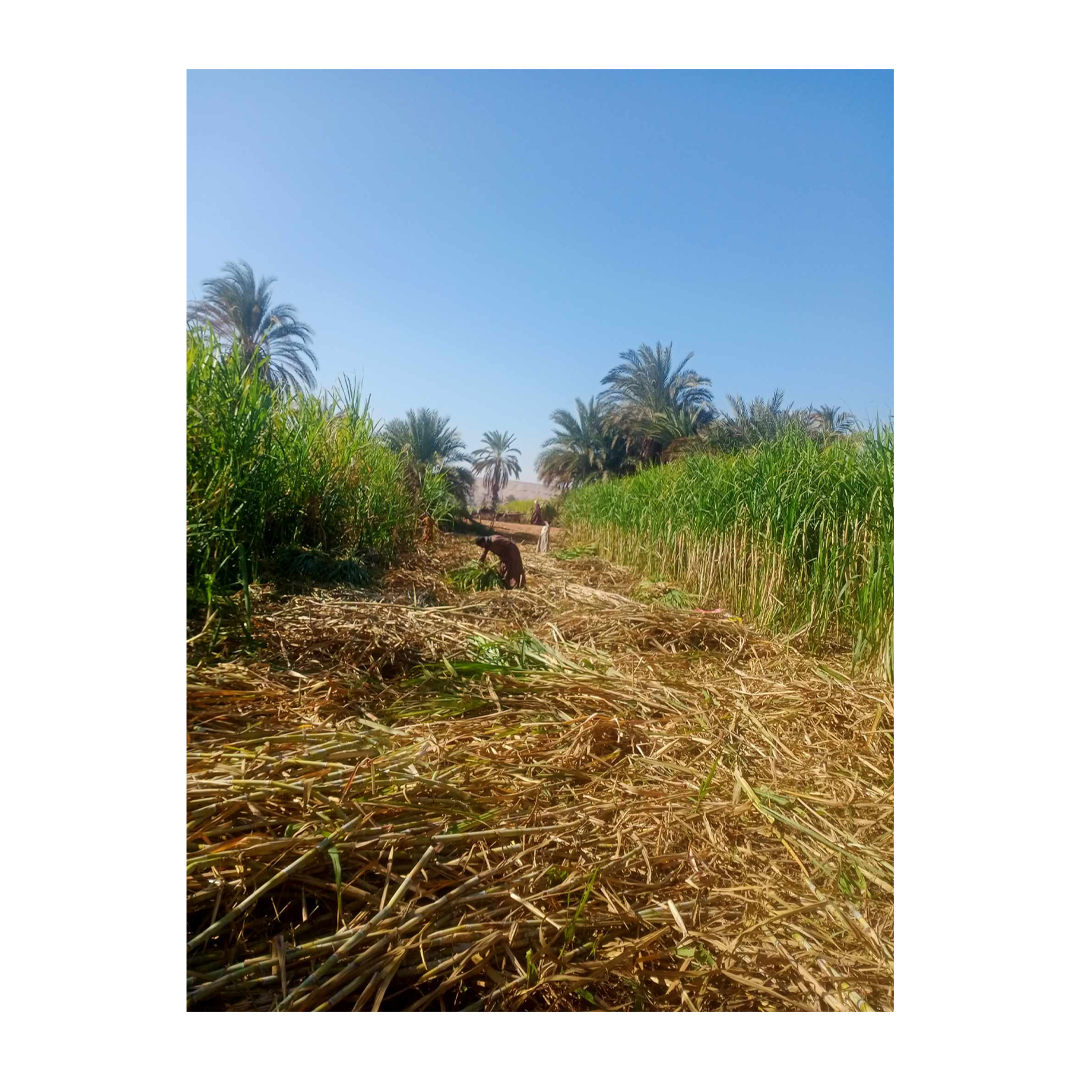 Sugarcane crop produce in Aswan
Sugarcane crop produce in Aswan
The most profitable alternative
Ahmed Sahab, a 55-year-old farmer from Minya and the director general of the Farmers Union, has been cultivating sugarcane for 30 years, producing 30-40 tons per acre on his 6 acres of land. He tells Raseef22 that despite other farmers moving on to other crops, he continues to cultivate sugarcane.
On the other hand, Khalid Issa, a farmer and member of the Sugar Crops Association in Sohag, ceased cultivating sugarcane in 2020, justifying his decision on low financial returns which prevent him from covering his expenses. Issa explains, “I planted around 5 acres of sugarcane in 2020 with an average productivity ranging from 25-30 tons per acre, but I decided to stop growing it, and replaced it with wheat in 2021 and 2022, and with beets in 2023.”
Sugarcane cultivation is estimated to span 300,000 acres in 2024, although this area was higher from 2019 to 2021, according to reports from the governmental Central Agency for Public Mobilization and Statistics. The cultivated area of sugar cane for the years 2020-2021 was 342,400 acres, compared to 336,100 acres for 2019-2020, an increase of 1.9%. The production quantity reached 15.95 million tons in 2020-2021, compared to 15.86 million tons in 2019-2020, an increase of 0.6%. Qena Governorate ranks first in production with 5.75 million tons and accounts for 36.0% of total production.
'Hello Renaissance Dam'
By 2018, Egypt was no longer able to avoid water poverty, especially after the construction of the Renaissance Dam, which failed to protect Egypt's historic share of water after a 2015 framework agreement was signed initiating the construction process without guarantees of review, and without binding Ethiopia to any commitments. As a result, Egypt began taking a number of belated and ill-considered measures to reduce its water usage on agriculture, which constitutes the largest consumer of water in the country. An initial decision was taken to limit the cultivation of certain water-intensive crops, including rice, sugarcane and bananas, provided that the Ministry of Agriculture issues annual decisions specifying the scopes and areas of cultivation for each of these crops.
Farmer Ahmed Sahab has been cultivating sugarcane for 30 years, producing 30-40 tons per acre on his 6 acres of land. He tells Raseef22 that despite other farmers moving on to other crops, he continues to cultivate sugarcane. Farmer Khalid Issa, on the other hand, ceased cultivating sugarcane in 2020, justifying his decision on low financial returns which prevent him from covering his expenses.
Since then, the cultivated area of sugarcane in Egypt has continued to fluctuate, declining by 10% from 2022 to 2023 (330,000 acres in 2022 versus 300,000 acres in 2023), according to Dr. Ahmed Attiya of the Sugar Crops Institute (SRCI), affiliated with the Agricultural Research Centre (ARC) in a statement made to Raseef22.
According to the 2021 report of the Sugar Crops Council, the global production of sugarcane is approximately 111.5 million tons, approximately 62% of global sugar production, which is estimated to be 179.8 million tons.
There are eight sugarcane production factories in Egypt, all in the upper part of the country, where the weather conditions are favorable. The cultivation of sugarcane for Egyptian conditions requires 8,000-10,000 cubic meters of irrigation water under flood irrigation conditions.
Dr. Assem AbdelMonem, assistant professor and researcher at the Central Laboratory for Agricultural Climate (CLAC) at the Agricultural Research Centre, tells Raseef22 that, tells Raseef22, “According to data from the Economic Affairs Sector of the Ministry of Agriculture, the area planted with sugarcane from 2015-2021 remained almost constant, reaching a minimum area of about 325,900 acres in 2016, and about 342,300 thousand acres in 2021– only a 5% change. Egyptian sugar production reached approximately 2.7 million tons, while domestic consumption in 2021 was about 3.32 million tons. The result is a deficit of around 608,000 tons of sugar, imported from abroad, for a self-sufficiency rate of 81%.”
According to the Economic Affairs Sector of the Ministry of Agriculture, sugarcane cultivation in 2020 was concentrated in only 5 governorates: Qena (total area of 120,000 acres), Aswan (91,000 acres), Luxor (67,000), Minya (37,000)acres, and Sohag (17,000 acres).
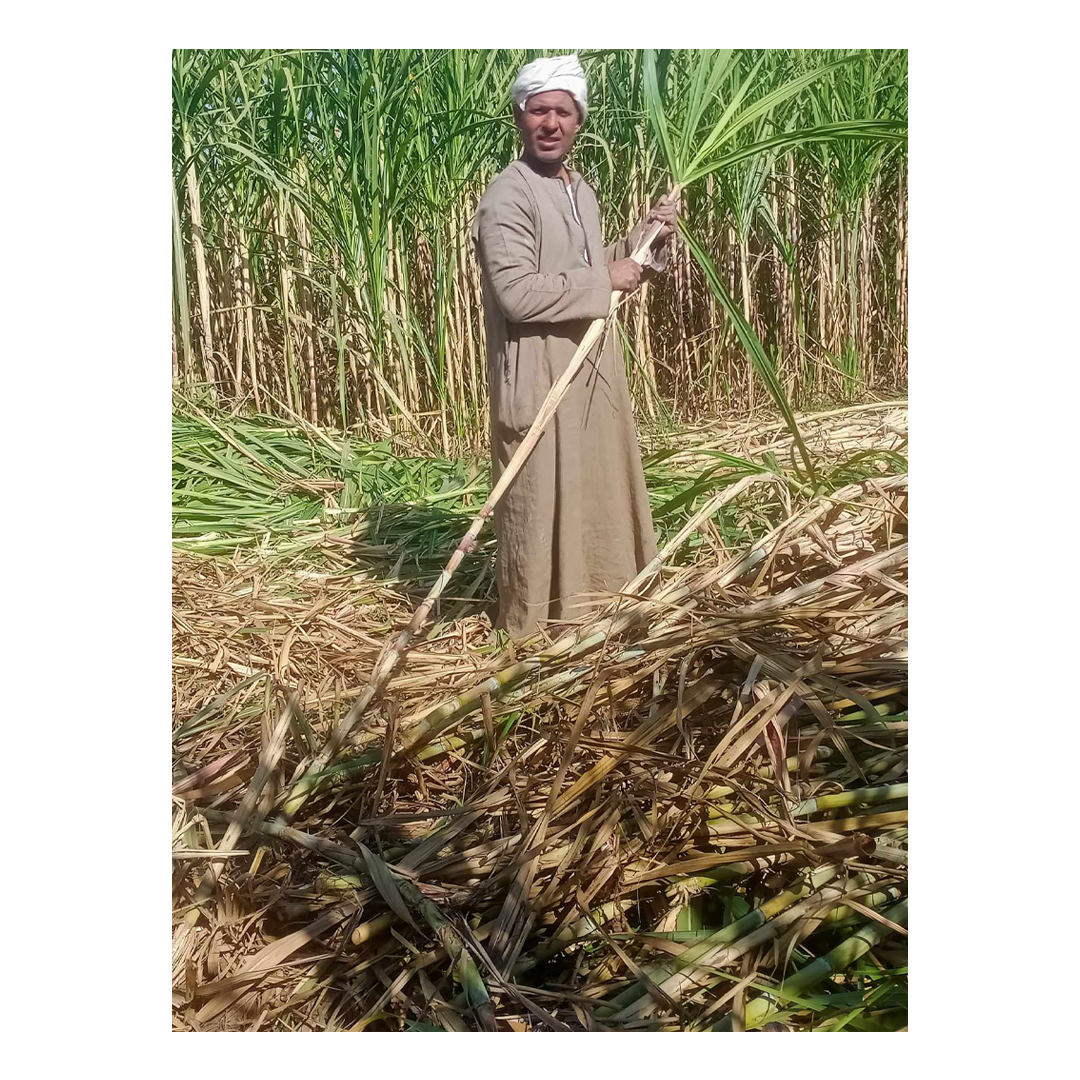 Sugarcane crop produce in Aswan
Sugarcane crop produce in Aswan
High production costs and low purchase prices
Abdel Nabi Demis, General Director of the Farmers' Union in Egypt, attributes the decline in sugarcane cultivation to the high prices of nitrogen fertilizers, costing 750 Egyptian pounds per unit. Each acre of sugarcane requires approximately 6 units of nitrogen fertilizer, and agricultural associations only provide two. Additionally, a 100% increase in labor costs imposed a burden on farmers, leading some to stop growing the crop entirely.
Dr. Attiya confirms to Raseef22 that the cultivated area of sugarcane decreased from 330,000 acres in 2022 to 300,000 acres in 2023. He attributes the closure of the Abu Qurqas Factory to a decline in supply, not production, as the Minya Governorate alone cultivates an estimated 30,000 acres worth of sugarcane. The official supply price dropped to 1,500 Egyptian pounds per ton, forcing many farmers to redirect the majority of their production to black honey presses, which offer a higher price than the Ministry of Supply. According to Attiya, Minya is renowned for its black honey mills, with its farmers supplying over 90% of their production. He calls for balancing the supply price of sugarcane and wheat, licensing the mills and centralizing them under the state, and setting an official supply price for the mills, in order to balance them with the state's factories. According to him, sugarcane accounts for approximately 40% of Egypt's sugar production, a total of 2.7 million tons. Beets represent the largest percentage.
The official supply price of sugarcane dropped to 1,500 Egyptian pounds per ton, forcing many farmers to redirect the majority of their production to black honey presses, which offer a higher price than the Ministry of Supply.
According to the CEO and Managing Director of the Egyptian Sugar and Integrated Industries Company (SAE), one acre of sugarcane crop, with an average production of 35 tons, is purchased by black honey mills for 100,000 Egyptian pounds (equivalent to $3,236), with the company absorbing transportation costs). Sugar factories, on the other hand, purchase sugarcane at 52,500 pounds per ton.
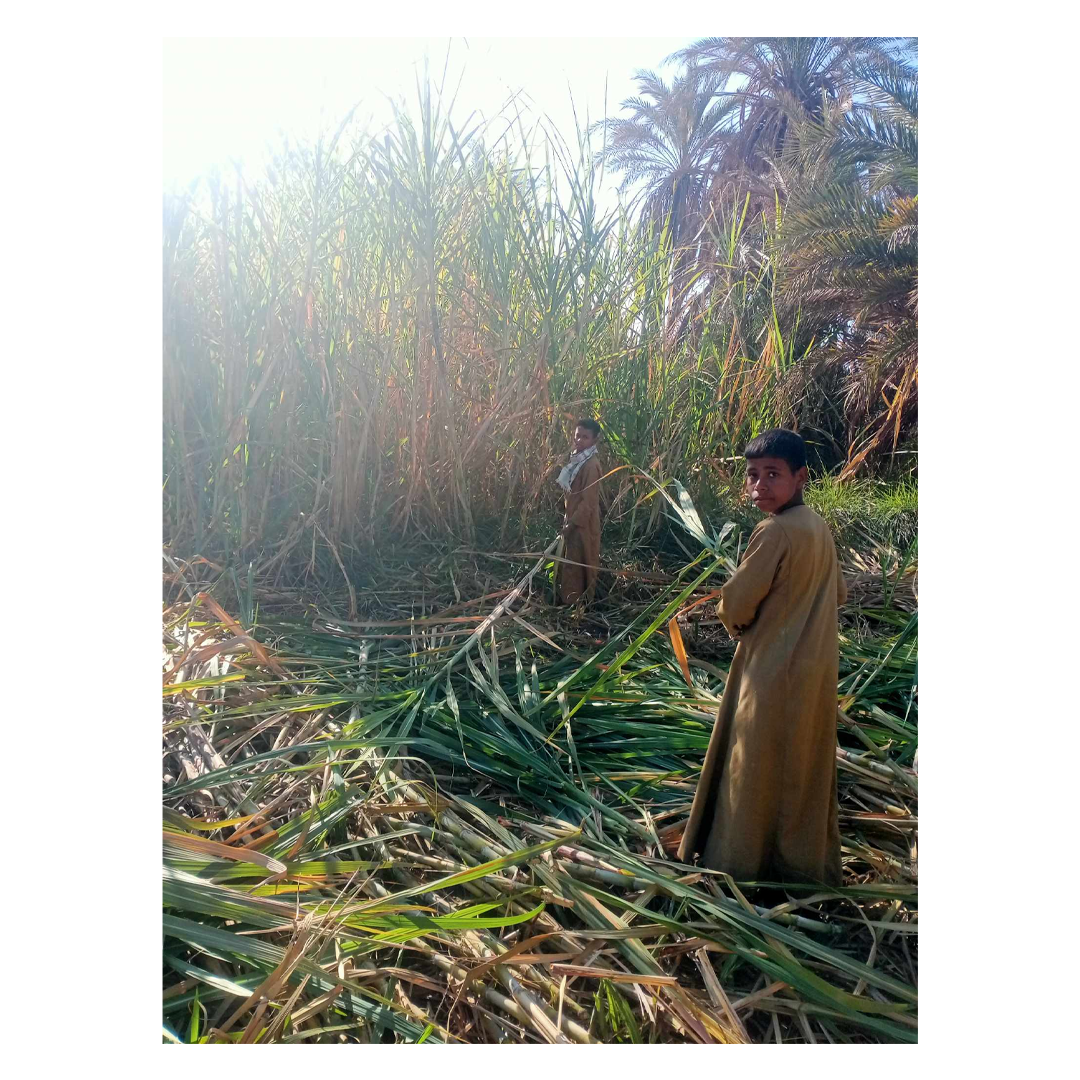 Sugarcane crop produce in Aswan
Sugarcane crop produce in Aswan
Will climate change deprive us of sugar?
Dr. Samia El-Marsafawy, head of the Weather and Climate Research Unit, points out that climate change will hurt Egypt’s agricultural sector more than any other sector, affecting agricultural land productivity, affecting the natural and biological properties of the land, along with the spread of pests, insects, and diseases, thus greatly impacting crops. Simulation models and various climate change scenarios indicate that climate change and the increase in Earth's temperature will reduce the productivity of each acre of sugarcane by 25%, and result in a 2.5% increase in water consumption.
According to the head of the genetics department at the Sugar Crops Institute, since the implementation of Egypt's decision to limit the cultivated areas of water-intensive crops, the increase or decrease in the cultivated area of sugar cane does not exceed 10%. He points out that climate change has affected the timing of planting and harvesting sugarcane, even if it can tolerate increased temperatures and humidity more than other crops.
Dr. Shaker Abolmaaty, a professor of agricultural climate at the Agricultural Research Centre, tells Raseef22 that all crops are affected to some extent by rising temperatures, and climate change in general. Heat stress causes crops to suffer from water stress due to increased evaporation, “consequently, we are working on compensating crops with water by increasing irrigation water.” He adds that the more stressed the crop, the weaker plant growth and subsequently, productivity.
“[Sugarcane] growth rates and stunting are affected by heat, water, and land stress, as well as seedling stress. This affects the amount of crops and the quantity of sugar produced. It also contributes to an increase in pest infestations, which may repeat more than once during the same season, placing the responsibility on the state to provide pesticides for pest control.”
Raseef22 is a not for profit entity. Our focus is on quality journalism. Every contribution to the NasRaseef membership goes directly towards journalism production. We stand independent, not accepting corporate sponsorships, sponsored content or political funding.
Support our mission to keep Raseef22 available to all readers by clicking here!
Interested in writing with us? Check our pitch process here!
